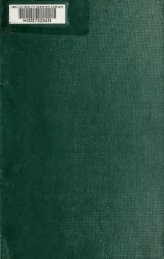1893-1894 - The University of North Carolina at Chapel Hill
1893-1894 - The University of North Carolina at Chapel Hill
1893-1894 - The University of North Carolina at Chapel Hill
You also want an ePaper? Increase the reach of your titles
YUMPU automatically turns print PDFs into web optimized ePapers that Google loves.
228 APPENDIX.<br />
A w<strong>at</strong>er supply from ruuning streams hardly merits consider<strong>at</strong>ion itt<br />
this connection, on account <strong>of</strong> the limited extent it is likely to be used<br />
for ordinary household purposes. In general it may be said th<strong>at</strong> a large<br />
stream with swift current flowing from a practically uninhabited territory<br />
will furnish w<strong>at</strong>er <strong>of</strong> s<strong>at</strong>isfactory quality. <strong>The</strong> presence <strong>of</strong> cities on its<br />
banks, using it as a drain to receive their sewage and other wastes, would<br />
virtually condemn the w<strong>at</strong>er without a hearing. <strong>The</strong> smaller the stream<br />
the more suspicious the w<strong>at</strong>er will n<strong>at</strong>urally become, and the small creeks<br />
and branches would hardh- be considered as having anj' claims worthy <strong>of</strong><br />
<strong>at</strong>tention unless the surroundings were <strong>of</strong> an unexceptionable n<strong>at</strong>ure.<br />
We may sum it all up by saying th<strong>at</strong> it almost entirely depends upon<br />
the local conditions <strong>of</strong> the w<strong>at</strong>er-shed whether the w<strong>at</strong>er <strong>of</strong> a stream can<br />
be used with safetj- for domestic consumption. If a sparsely settled<br />
region, where the soil is cultiv<strong>at</strong>ed to a limited extent only, the organic<br />
impurity will n<strong>at</strong>urally be compar<strong>at</strong>ively small and <strong>of</strong> vegetable origin.<br />
Still such supplies require to be zealousl}' guarded to insure absolute freedom<br />
from danger, as witness the terrible epidemic <strong>of</strong> typhoid fever <strong>at</strong><br />
Plymouth, Pa., a few years ago. <strong>The</strong> excreta <strong>of</strong> a t3^phoid p<strong>at</strong>ient some<br />
miles from the city had been throv^n out on the snow, and the spring<br />
thaws had carried it into the mountain stream from which a part <strong>of</strong> the<br />
city derived its suppl)-. <strong>The</strong> w<strong>at</strong>er had been <strong>of</strong> undoubted purit}-, coming<br />
as it did from a sparseh- settled mountainous region, and it was a long<br />
time before any suspicion <strong>of</strong> the true cause <strong>of</strong> the epidemic was entertained.<br />
<strong>The</strong> part <strong>of</strong> the town getting its suppl}' from a river <strong>of</strong> r<strong>at</strong>her<br />
doubtful quality entirely escaped the epidemic. This fact, however,<br />
should not lead us to put our trust in w<strong>at</strong>er supplies <strong>of</strong> suspicious character,<br />
but r<strong>at</strong>her to exercise strict w<strong>at</strong>chfulness over the source <strong>of</strong> supply,<br />
however high its rank as a wholesome w<strong>at</strong>er, or however free it may<br />
appear to be from prospective contamin<strong>at</strong>ion. <strong>The</strong> case I have just<br />
referred to is a striking example <strong>of</strong> the danger <strong>of</strong> a good supply being<br />
polluted by a specific germ <strong>of</strong> disease.<br />
In some localities in our St<strong>at</strong>e a plentiful suppl}' <strong>of</strong> w<strong>at</strong>er <strong>of</strong> s<strong>at</strong>isfactory<br />
quality may be had from wh<strong>at</strong> are known as driven wells; th<strong>at</strong> is,<br />
pipes perfor<strong>at</strong>ed <strong>at</strong> the point and driven into the ground to the proper depth,<br />
the pump being <strong>at</strong>tached to the surface end <strong>of</strong> the pipe. Of course this<br />
type <strong>of</strong> well presupposes th<strong>at</strong> the mass <strong>of</strong> earth above the w<strong>at</strong>er-bearing<br />
str<strong>at</strong>um is virtuall}- nothing but sand, and where the locality is thickly<br />
settled the chances are th<strong>at</strong> the w<strong>at</strong>er will be contamin<strong>at</strong>ed with organic<br />
impurities leaching down from above. <strong>The</strong>se w<strong>at</strong>ers are generally cool,,<br />
<strong>of</strong> a fair degree <strong>of</strong> s<strong>of</strong>tness and well adapted for household use. In a<br />
sparsely settled locality it is quite probable th<strong>at</strong> the surface impurities,<br />
would be so small in quantitj' th<strong>at</strong> they would be elimin<strong>at</strong>ed before reaching<br />
the ground w<strong>at</strong>er level, the sandy str<strong>at</strong>um acting as a filter <strong>of</strong> the<br />
intermittent type, which the very elabor<strong>at</strong>e and extensive experiments <strong>of</strong>



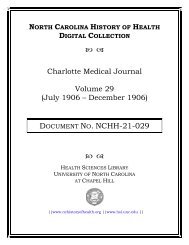
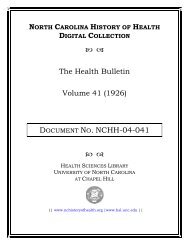
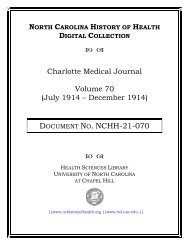
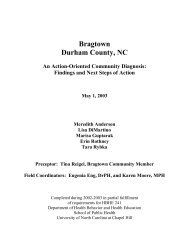
![Bulletin of the North Carolina Board of Health [serial] - University of ...](https://img.yumpu.com/48032016/1/153x260/bulletin-of-the-north-carolina-board-of-health-serial-university-of-.jpg?quality=85)
![The Health bulletin [serial] - University of North Carolina at Chapel Hill](https://img.yumpu.com/47603625/1/169x260/the-health-bulletin-serial-university-of-north-carolina-at-chapel-hill.jpg?quality=85)
![The Health bulletin [serial] - University of North Carolina at Chapel Hill](https://img.yumpu.com/47242858/1/169x260/the-health-bulletin-serial-university-of-north-carolina-at-chapel-hill.jpg?quality=85)
![The Health bulletin [serial] - University of North Carolina at Chapel Hill](https://img.yumpu.com/43204263/1/172x260/the-health-bulletin-serial-university-of-north-carolina-at-chapel-hill.jpg?quality=85)
![The Health bulletin [serial] - University of North Carolina at Chapel Hill](https://img.yumpu.com/41981074/1/163x260/the-health-bulletin-serial-university-of-north-carolina-at-chapel-hill.jpg?quality=85)
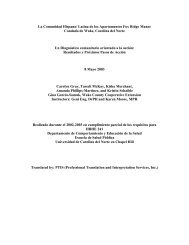
![The Health bulletin [serial] - University of North Carolina at Chapel Hill](https://img.yumpu.com/40912928/1/164x260/the-health-bulletin-serial-university-of-north-carolina-at-chapel-hill.jpg?quality=85)
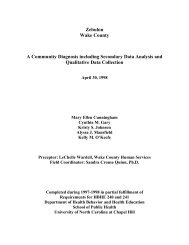
![The Health bulletin [serial] - University of North Carolina at Chapel Hill](https://img.yumpu.com/35643061/1/167x260/the-health-bulletin-serial-university-of-north-carolina-at-chapel-hill.jpg?quality=85)
![Biennial report of the North Carolina State Board of Health [serial]](https://img.yumpu.com/34024350/1/166x260/biennial-report-of-the-north-carolina-state-board-of-health-serial.jpg?quality=85)
